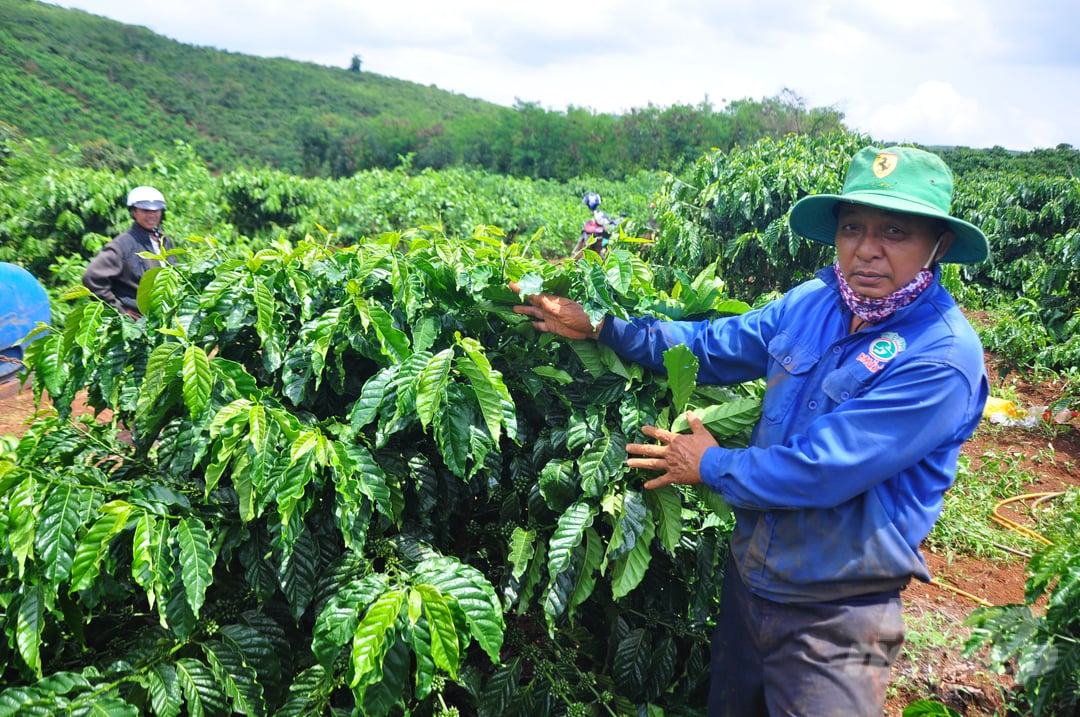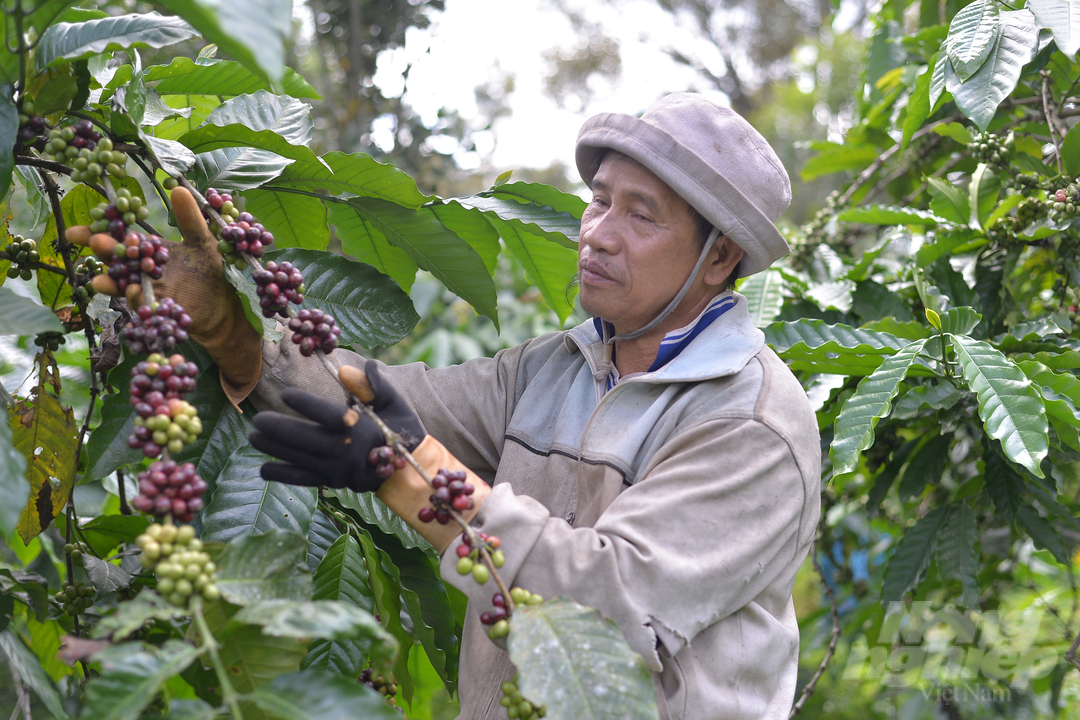November 28, 2025 | 01:27 GMT +7
November 28, 2025 | 01:27 GMT +7
Hotline: 0913.378.918
November 28, 2025 | 01:27 GMT +7
Hotline: 0913.378.918
In Tan Nghia commune (Di Linh district, Lam Dong province), Mr. Bui Trung Dang's family has just had a bumper coffee crop with a yield of over 4 tons of kernels/ha. The family planted 1.5 ha of coffee in 1994 and by 2017, the trees in the garden became old with poor productivity. In order to "revive" the family's income, Mr. Bui Trung Dang decided to start replanting with high-quality, disease-resistant seeds provided by the Western Institute of Agricultural and Forestry Science Institute (WASI). Together with his family members, Mr. Dang researched and came up with the standard farming procedure after hearing the recommendation of the local agricultural sector.

With new effective varieties and a new farming procedure, the replanting model of Mr. Bui Trung Dang's family in Di Linh district (Lam Dong) resulted in high coffee yield. Photo: Minh Hau.
“After removing the old, poor quality coffee, our family implemented measures to improve the soil and eliminate pathogens in order and diligently follow the regulations on time. It was when the soil became free of pathogens that we proceeded to plant the seeds. This is a completely different way, more scientific than the traditional methods. As a result, the survival rate of plants reaches 98%, the uniformity rate is also very high," said Mr. Dang.
Meanwhile, along with applying high-quality seeds to replanting, households in Nam Ban Agricultural Cooperative (Nam Ban town, Lam Ha district, Lam Dong) have installed an economical watering system to ensure plant growth in the dry season. The members of this cooperative also build a sustainable coffee model by utilizing canopy-creating solutions, intercropping with other economically valuable trees such as avocado, macadamia, and durian.
Mr. Tran Van Xuat, Director of Nam Ban Agricultural Cooperative, said, “Thanks to the implementation of new production processes, the coffee garden of cooperative members has experienced a significant change. Not only this new model contributes to reducing input costs, the intercropping approach also increases income for households, helping the members stabilize their economy to develop sustainable coffee production”. This cooperative’s coffee model is two times more profitable than the old production method. In particular, the coffee yield is over 4 tons/ha, the quality is improved, hence an increase in selling price.
Mr. Trinh Tan Vinh, a resident of Tan Phu 2 village (Dinh Lac commune, Di Linh district, Lam Dong), famous for the organic coffee brand "Honey cafe Thuan Trinh", said that his family had switched from the traditional coffee method to organic production since 2008.

To increase the value of coffee and protect human health as well as the environment, the family of Mr. Trinh Tan Vinh in Di Linh district, Lam Dong decided to develop an organic coffee model. Photo: Minh Hau.
The family’s garden of 1 ha has installed a layer of vegetation with pinto peanut leaves to retain moisture and create an ecosystem within the area. As for the higher layer, Mr. Vinh grows macadamia, durian as shade trees associated with economic development. “To ensure the growth of plants, the family uses self-composting organic fertilizers or micro-fertilizers. In case the tree is infected with pests or diseases, we will take preventive measures with the help of biological products," he said.
Already devoting himself to ensuring the organic standards, Mr. Vinh’s family also organizes selective harvesting to have 100% ripe fruit ready for preliminary processing and processing. According to the garden owner, with the current model, each year his family produces and supplies to domestic and foreign markets over 1 ton of finished organic honey coffee and over 2 tons of regular organic powdered coffee. “Thanks to this method, the family's coffee products are sold at a much higher price. The family only has 1 ha, but the product is qualified enough to be sold abroad”.

Lam Dong farmers are selling safe and organic coffee products at a higher price than conventional coffee products. Photo: Minh Hau.
Mr. Nguyen Van Chau, Deputy Director of Lam Dong Department of Agriculture and Rural Development, said the province was currently implementing an organic agriculture project towards green and circular agriculture.
As for coffee, one of the key crops of the locality, Lam Dong focuses on building sustainable models, putting good varieties into production with scientific processes. Local authorities encourage people, businesses and cooperatives to develop specialty coffee and high-quality coffee, especially focusing on processing to add value to the product.
Translated by Samuel Pham

(VAN) According to Mr. Vo Minh Thanh, Director of the Tay Ninh Department of Agriculture and Environment, Resolution 57 has created a new development pathway for the locality, shifting from traditional toward modern agriculture.
/2025/11/26/4909-2-154329_878.jpg)
(VAN) Pearl grouper farming in HDPE cages not only delivers economic efficiency but also contributes to protecting the environment, creating jobs, and promoting marine-based experiential tourism.

(VAN) The model of making a living under the forest canopy through the agroforestry system in Van Son commune, Bac Ninh province, is expected to generate an annual income of approximately VND 30 million/ha.

(VAN) Many enterprises in Can Tho are harnessing natural energy and reducing greenhouse gas emissions in their production processes, thereby contributing to the promotion of a sustainable green transition.
/2025/11/24/3536-2-112800_176.jpg)
(VAN) Dong Nai now has tens of thousands of hectares of forests certified for sustainable management, and this area will continue to be expanded in the coming period.

(VAN) Vinh Ha hamlet (Dai Xuyen commune, Hanoi) is shifting away from small-scale farming as households adopt bioscurity into their breeder chicken models.

(VAN) Heavy rains make aquatic species more vulnerable to disease. Proactive water management and high-tech systems help farmers prevent outbreaks and protect yields.